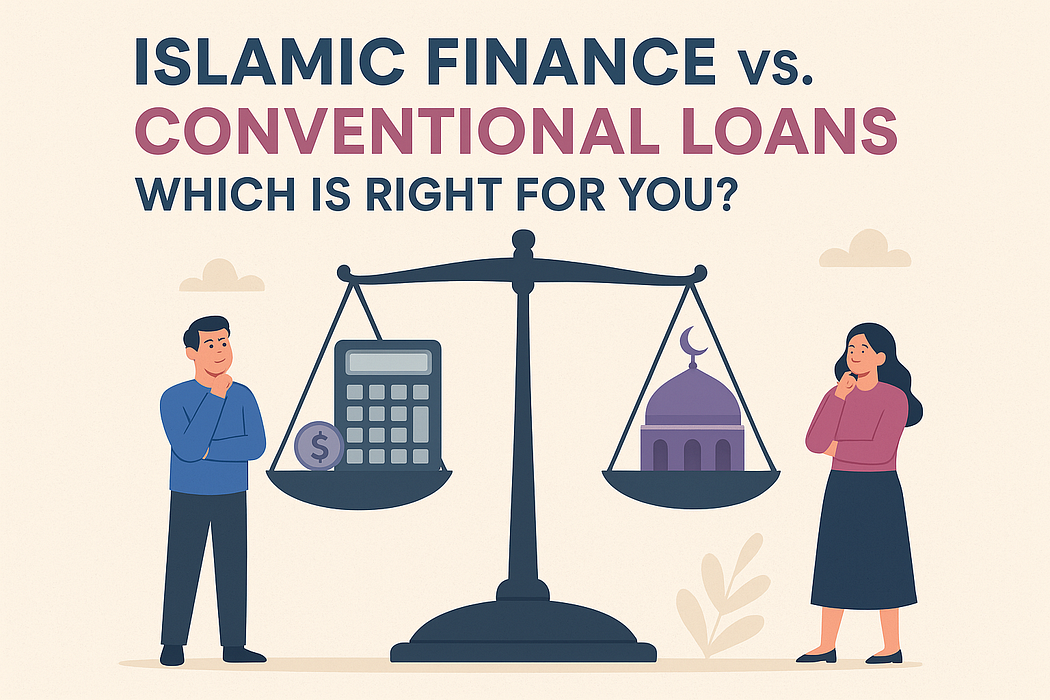Islamic Finance vs. Conventional Loans: Which Is Right for You?
Wiki Article

When it comes to borrowing money, most people find themselves deciding between conventional loans and Islamic finance solutions. Both aim to provide access to funds, but they differ significantly in structure, principles, and long-term impact on borrowers. Understanding these differences can help you make an informed decision.
What is Conventional Lending?
Conventional loans are interest-based. You borrow a sum from a bank or lender and repay it with added interest (riba) over a fixed term. For example, a personal loan of AED 100,000 at 6% annual interest may cost you around AED 116,000 over 3 years. The system is profit-driven and widely used across the globe.
What is Islamic Finance?
Islamic finance, on the other hand, is built on principles of fairness and shared risk. Instead of charging interest, banks and financial institutions use trade-based contracts like:
- Murabaha (Cost-plus financing) — Bank buys an asset and sells it to the customer at an agreed markup.
- Ijara (Leasing) — Similar to leasing, where you pay rent for using an asset.
- Mudarabah & Musharakah (Partnerships) — Profit and loss are shared between lender and borrower.
This ensures that financing remains asset-backed, ethical, and transparent.
Key Differences at a Glance
AspectConventional LoansIslamic FinanceBasisInterest-basedInterest-free, trade/asset-basedRiskBorrower bears most riskRisk is sharedEthicsProfit-drivenEthical, values-drivenFlexibilityFixed interest & repaymentsStructured via contracts (Murabaha, Ijara, etc.)
The Growing Preference for Islamic Finance
According to the Islamic Financial Services Board (IFSB), global Islamic finance assets reached USD 4.5 trillion in 2022 and are projected to grow 10–12% annually. In the UAE, institutions like Mawarid Finance are recognized among the Best Islamic Banks in the UAE, offering tailor-made solutions for individuals and SMEs.
Which One is Right for You?
- If you value predictability and familiarity, conventional loans may feel straightforward.
- If you prefer ethical, interest-free, and risk-sharing solutions, Islamic finance could be the better choice.
Ultimately, the decision depends on your financial goals, values, and comfort level with either system.
Why Mawarid Finance Might Be the Right Choice
As you weigh your options, here’s where an Islamic finance company like Mawarid Finance adds value:
- Reputation: Known for delivering innovative Islamic Personal Finance Solutions without compromising on ethics or clarity.
- Service Range: Covers both individual and corporate customers, offering solutions tailored to unique needs.
- Growth-Mindset: Committed to evolving in line with industry growth, regulation, and the rising demand for ethical finance.
- Local Strength: Based in the UAE, Mawarid enjoys strong oversight, understands market specifics, and has a presence shaped by both tradition and innovation.
Conclusion :
If you’re after predictability, ethical alignment, shared risk, and transparent contracting, Islamic finance is likely to be more suitable for you. Conventional loans can still be a good fit if you prioritize speed, broad availability, or more familiar structures — even though they often come with interest and less mutual risk.
For those leaning toward Islamic finance, working with a trusted provider like Mawarid Finance ensures you access high-quality, well-regulated, and customized Islamic finance solutions. Whether you’re taking out a personal finance solution, mortgage, or business financing, matching the product to your values and financial capacity is what matters most.
Report this wiki page